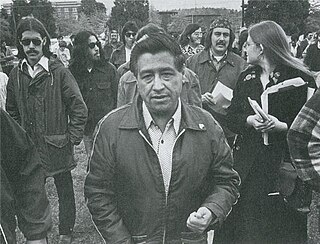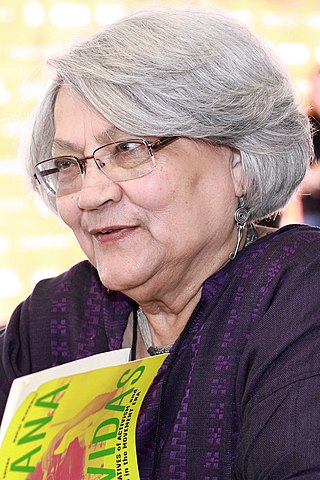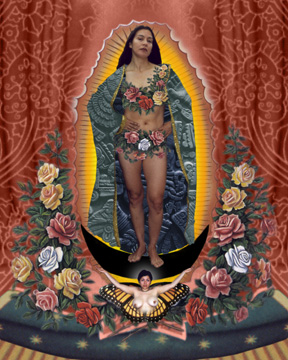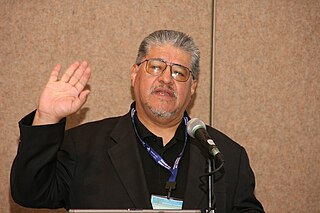
Chicano, Chicana, is an identity coined by the Indigenous peoples of Mexico that live in the U.S and have a non-Anglo self-image. Chicano was originally a classist and racist slur used toward low-income Mexicans that was reclaimed in the 1940s among youth who belonged to the Pachuco and Pachuca subculture. In the 1960s, Chicano was widely reclaimed in the building of a movement toward political empowerment, ethnic solidarity, and pride in being of indigenous descent. Chicano developed its own meaning separate from Mexican American identity. Youth in barrios rejected cultural assimilation into whiteness and embraced their own identity and worldview as a form of empowerment and resistance. The community forged an independent political and cultural movement, sometimes working alongside the Black Power movement.

Chicano rock is rock music performed by Mexican American (Chicano) groups or music with themes derived from Chicano culture. Chicano Rock, to a great extent, does not refer to any single style or approach. Some of these groups do not sing in Spanish at all, or use many specific Latin instruments or sounds. The subgenre is defined by the ethnicity of its performers, and as a result covers a wide range of approaches.

Pachucos are male members of a counterculture associated with zoot suit fashion, jump blues, jazz and swing music, a distinct dialect known as caló, and self-empowerment in rejecting assimilation into Anglo-American society that emerged in El Paso, Texas, in the late 1930s. The pachuco counterculture flourished among Chicano boys and men in the 1940s as a symbol of rebellion, especially in Los Angeles. It spread to women who became known as pachucas and were perceived as unruly, masculine, and un-American. Some pachucos adopted strong attitudes of social defiance, engaging in behavior seen as deviant by white/Anglo-American society, such as marijuana smoking, gang activity, and a turbulent night life. Although concentrated among a relatively small group of Mexican Americans, the pachuco counterculture became iconic among Chicanos and a predecessor for the cholo subculture which emerged among Chicano youth in the 1980s.

Cherríe Moraga is a Chicana feminist, writer, activist, poet, essayist, and playwright. She is part of the faculty at the University of California, Santa Barbara in the Department of English. Moraga is also a founding member of the social justice activist group La Red Chicana Indígena which is an organization of Chicanas fighting for education, culture rights, and Indigenous Rights.

The Chicano Movement, also referred to as El Movimiento, was a social and political movement in the United States inspired by prior acts of resistance among people of Mexican descent, especially of Pachucos in the 1940s and 1950s, and the Black Power movement, that worked to embrace a Chicano/a identity and worldview that combated structural racism, encouraged cultural revitalization, and achieved community empowerment by rejecting assimilation. Before this, Chicano/a had been a term of derision, adopted by some Pachucos as an expression of defiance to Anglo-American society. With the rise of Chicanismo, Chicano/a became a reclaimed term in the 1960s and 1970s, used to express political autonomy, ethnic and cultural solidarity, and pride in being of Indigenous descent, diverging from the assimilationist Mexican-American identity. Chicanos also expressed solidarity and defined their culture through the development of Chicano art during El Movimiento, and stood firm in preserving their religion.

Luis Miguel Valdez is an American playwright, screenwriter, film director and actor. Regarded as the father of Chicano film and playwriting, Valdez is best known for his play Zoot Suit, his movie La Bamba, and his creation of El Teatro Campesino. A pioneer in the Chicano Movement, Valdez broadened the scope of theatre and arts of the Chicano community.
Mexican American literature is literature written by Mexican Americans in the United States. Although its origins can be traced back to the sixteenth century, the bulk of Mexican American literature dates from post-1848 and the United States annexation of large parts of Mexico in the wake of the Mexican–American War. Today, as a part of American literature in general, this genre includes a vibrant and diverse set of narratives, prompting critics to describe it as providing "a new awareness of the historical and cultural independence of both northern and southern American hemispheres". Chicano literature is an aspect of Mexican American literature.
Diane Rodriguez was an American theatre artist who directed, wrote and performed. An OBIE Award winning actress, she was known for using comedy to confront various forms of oppression, often with special attention to issues of gender and sexuality.
Erika Chong Shuch is an American theatrical performer, director, choreographer, and educator based in San Francisco, California. Her work has appeared on stages in the San Francisco Bay Area, Washington, DC, and Seoul, South Korea.

Martha P. Cotera is a librarian, writer, and influential activist of both the Chicano Civil Rights Movement and the Chicana Feminist movement of the 1960s and 1970s. Her two most notable works are Diosa y Hembra: The History and Heritage of Chicanas in the U.S. and The Chicana Feminist. Cotera was one of six women featured in a documentary, Las Mujeres de la Caucus Chicana, which recounts the experiences of some of the Chicana participants of the 1977 National Women's Conference in Houston, Texas.
Emplumada is the first collection of poetry authored by Lorna Dee Cervantes. It was published in 1981 by University of Pittsburgh Press.
Amparo Garcia-Crow is an American writer, director and actress, based in Austin, Texas. Garcia-Crow identifies herself as an "inter-disciplinary artist who acts, directs, sings, writes plays, screenplays and songs" as well as a film artist, with a "strong focus...for the last few years...in storytelling and the development of solo work" as she currently directs performance artists and storytellers.

Octavio Solis is an American playwright and director whose plays have been produced and show theaters and small companies across the United States. He has written over 25 plays, including his most famous works: Lydia, Santos & Santos and Man of the Flesh. His works have earned numerous awards and grants.
Lydia is a magical realist drama by Latino-American playwright Octavio Solis. The play first premiered in the Space Theatre at the Denver Center for the Performing Arts on January 24, 2008. The production was directed by Juliette Carrillo. The play is partially inspired by Octavio Solis's own experiences growing up on the Mexican-American Border in El Paso, Texas. It explores the experience of a Mexican-American family living on the Texas–Mexican border, trying to live out their own version of the American Dream amidst the aftermath of an accident that changes all of their lives.
Tlaloc Rivas is a Mexican-American writer, producer, and theatre director. He is one of the co-founders of the Latinx Theatre Commons, which works side by side with HowlRound to revolutionize American theater and to highlight and promote the contributions and presence of Latinos in theatre. Central to Rivas' work is the Latino experience, but also exploring the American experience through the lens' of underrepresented voices. Rivas focuses on writing and directing plays that significantly explore Latino identity and history. Additionally, Rivas has also translated and adapted plays from the Spanish language and directed Spanish-language and bilingual plays such as Mariela in the Desert by Karen Zacarias and classical works such as Peribáñez y el Comendador de Ocaña.
Dorinda Moreno is an American Chicana activist, feminist and writer.
Cara Mía Theatre Co. is a Dallas-based company founded in 1996 by Adelina Anthony and Eliberto Gonzalez. It is dedicated to highlighting the Latino American experience in the United States through theatrical productions and educational programs. It started as a Chicano theatre to tell the stories of Mexican Americans on Dallas stages and make Latino literature more accessible.
Jorge Alfonso Huerta is a Chicano scholar, author, and theater director. He specializes in Chicano and United States Latinx Theatre. He has written and edited several books specializing in Chicano theatre and is considered to be an authoritative expert in his field.

The term Chicanafuturism was originated by scholar Catherine S. Ramírez which she introduced in Aztlán: A Journal of Chicano Studies in 2004. The term is a portmanteau of 'chicana' and 'futurism', inspired by the developing movement of Afrofuturism. The word 'chicana' refers to a woman or girl of Mexican origin or descent. However, 'Chicana' itself serves as a chosen identity for many female Mexican Americans in the United States, to express self-determination and solidarity in a shared cultural, ethnic, and communal identity while openly rejecting assimilation. Ramírez created the concept of Chicanafuturism as a response to white androcentrism that she felt permeated science-fiction and American society. Chicanafuturism can be understood as part of a larger genre of Latino futurisms.

Chicano literature is an aspect of Mexican-American literature that emerged from the cultural consciousness developed in the Chicano Movement. Chicano literature formed out of the political and cultural struggle of Chicana/os to develop a political foundation and identity that rejected Anglo-American hegemony. This literature embraced the pre-Columbian roots of Mexican-Americans, especially those who identify as Chicana/os.









